Do you have a friend or coworker who just seems to know how to build rapport with pretty much anyone in any social situation?
It may seem like magic..they walk over, start talking, and it looks like they’ve known each other for years--even though they just met!
That’s the power learning how to build rapport.
And the great thing is...building rapport is a learnable skill... and that’s what we’re talking about today.
In this article you’ll learn…
- What building rapport is
- Why building rapport matters
- Rapport building examples so that you can build rapport quickly
- 3 Rapport destroying traps to avoid
What is Rapport?
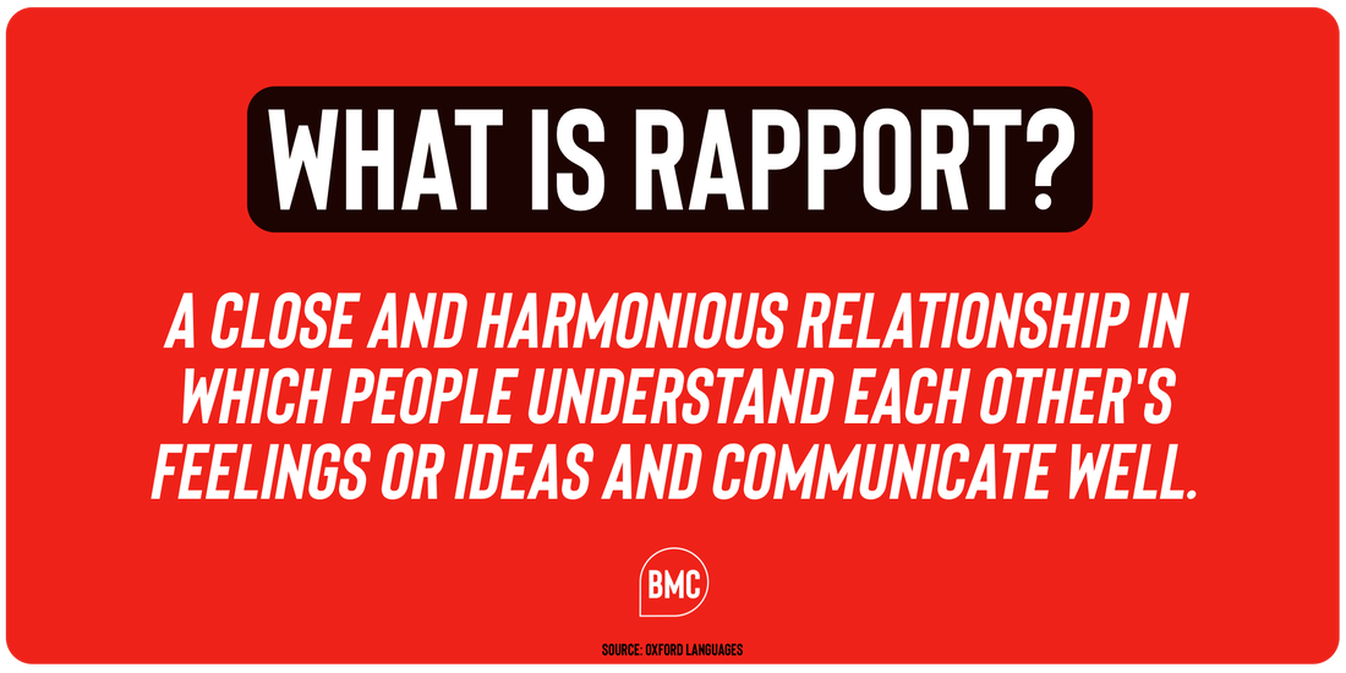
In order to build something, you have to know what it is, and a simple definition of rapport is the connection and relationship we build with others.
Two people who have good rapport with one another understand each other’s feelings and ideas.
The phrase “in rapport” is very similar to “in sync” and is often used to describe two people who are interacting seamlessly with one another, or just enjoying each other’s company with lots of comfort.
An example of a relationship with poor rapport would be two people who aren’t connected, and don’t feel like they understand the other person very well.
Now, let’s cover why rapport is so important...
Why Building Rapport Matters
Having good rapport with people you meet makes life easier and more enjoyable for you and other people you see every day.
Good rapport can even mean the difference between getting a promotion or not in the workplace. Building rapport is also important in social settings, because who doesn’t want the ability to make some new friends you connect with on a deep level?
Here are 9 things you can do to set yourself up for success as you build rapport with people.
1. Stack The Deck In Your Favor

If you already know some things about a person you’ll be talking to, great!
Bring those things up in the conversation as ways to spark their interest and get a good conversation going. Something like “Our mutual friend said you’re a baseball fan?” or “I couldn’t help overhearing that you just got back from Iceland? That’s so cool!” is a safe way to get them to talk about their interest.
You can help yourself out by doing a little research, too. Find some people who know the person you want to build rapport with.
Ask those people what the person is like, and ask if there are topics that make that person really excited. Then you can bring up those interests to use as ice breakers.
Listen in on former BMC podcast guest Dave Bowden talk about stacking the deck in his favor at a dinner party:
2. Empathize Like a Champ!

The name of the game with rapport is a feeling of understanding with another individual.
Being able to empathize is a great way to show you care and understand, ultimately setting the table for a great opportunity to build rapport with someone.
Generally, empathy is something that is much easier to give when it’s been received, so both parties benefit from genuine empathy.
For example, mirroring the emotion behind their words. If they tell you about a challenge and they seem frustrated, then an empathetic “Man, that sounds rough!” can go a long way.
3. Play The Name Game
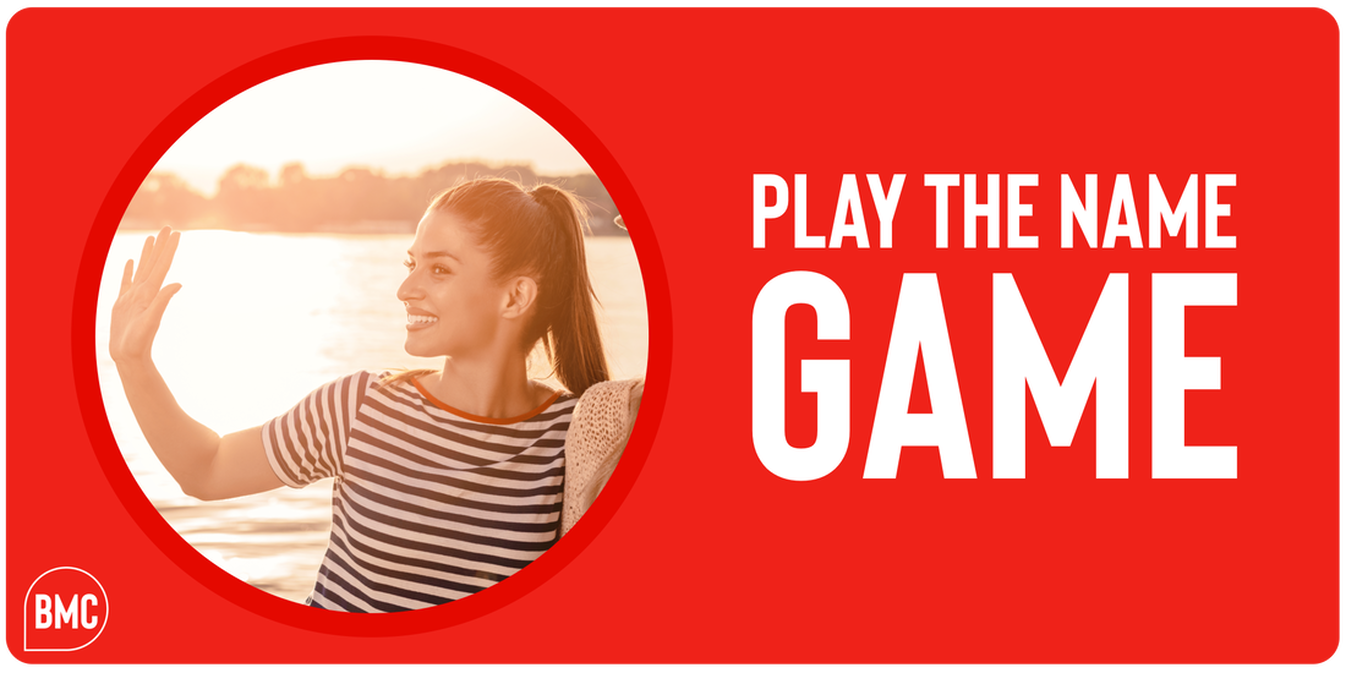
Let's polish off this old chestnut from Dale Carnegie:
“A person's name is to him or her the sweetest and most important sound in any language.”
It's true!
Using people's names in conversation is an easy way to connect with them and build rapport.
But here's the thing: Using names is a lot like using salt when cooking.
A little salt? Great!
Too much salt? Looks like we're getting Bite Squad.
What we DON'T want to do: Use people's names 47 times in conversation:
- "Hey, John. Nice to meet you John! So tell me what do you like to do in your John spare John time John. John? John?! JOHHHNNN!!!!"
A better approach: Use their name once in conversation after they introduce themselves. (This will also help you remember their name!)
Have trouble remembering people's names? Check out this TED article on remembering names.
4. Listen For “Same Here” Moments
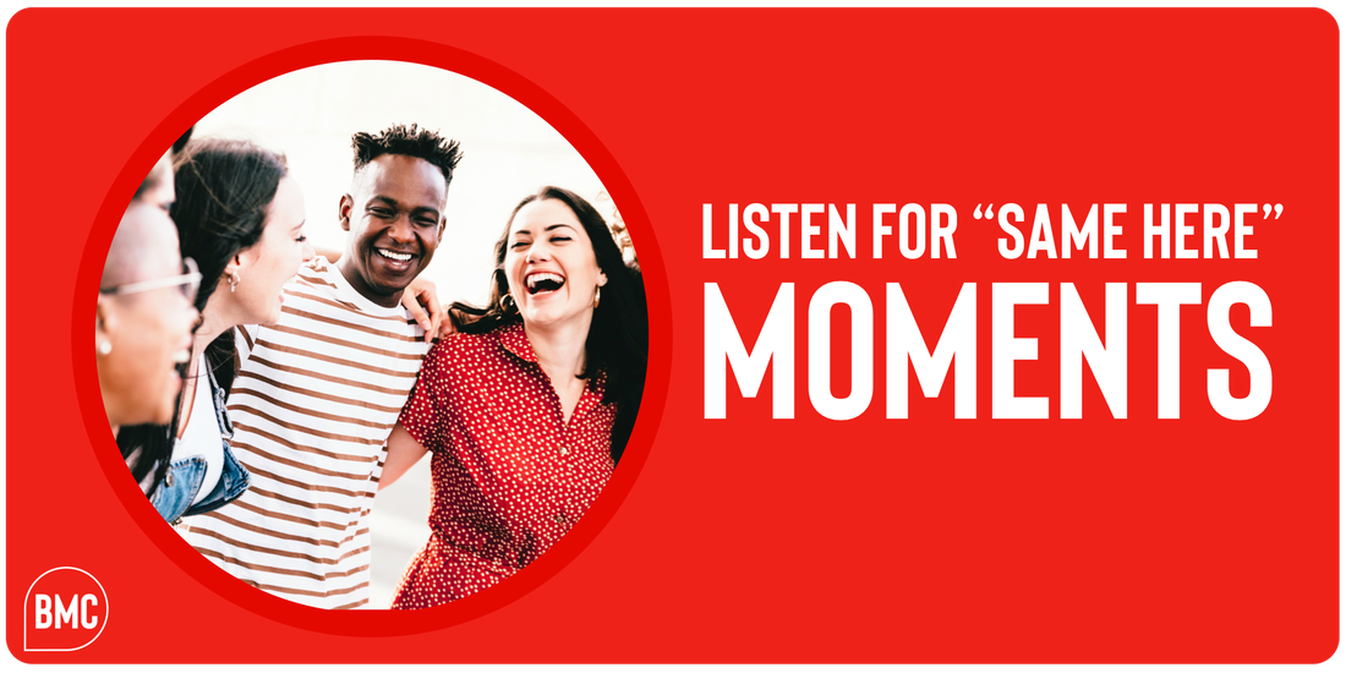
One of the fastest ways to keep a conversation going and build rapport is listening for “same here” moments.
What is a “same here” moment?
It’s any moment when you discover that you have a similar hobby, interest or common link.
- Maybe you’re both into the same YouTube channel
- Maybe you both went to the same college
- Maybe you both are into the same Netflix show
Whatever the case may be, when you uncover those moments, call them out!
Those moments are pure gold! And they signal to the other person that you’re in the same “tribe” that they’re in. (This happens to me when I’m wearing one of my baseball caps. Other fans of the same team usually comment on it)
The more shared connections you have with someone, the more likely you’ll hit it off!
5. Set Them Up For Rapport Building Success With “Dig Questions”
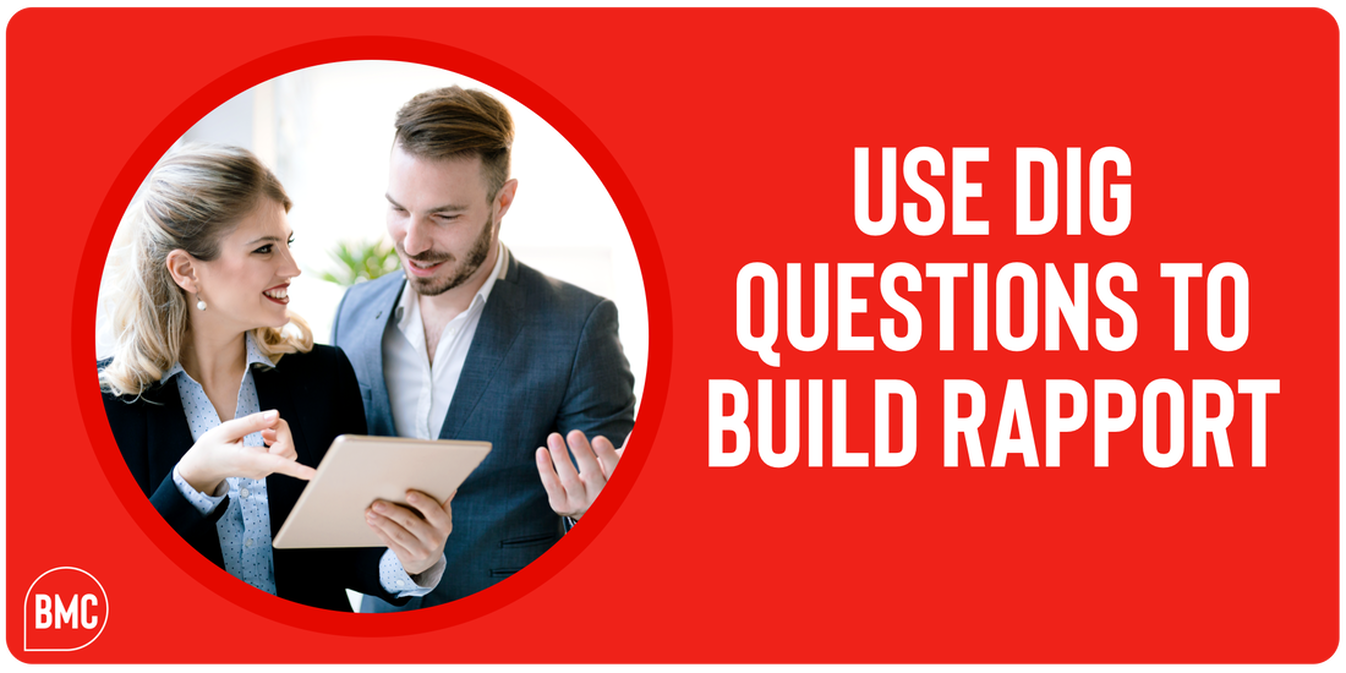
Though it may not be obvious, most people are going to be trying to build good rapport with you, as well, and helping them do so also helps yourself.
Make sure to really empathize with points the other party seems to really care about, and ask some “dig” questions such as “Why do you think you felt that way?” or “That’s awesome! Tell me more!” This makes people feel more welcomed, and allows you to have more opportunities to find common interests to discuss.
More examples of “dig questions” include:
- "Tell me more about x."
- "Why x? What’s the story there?"
- "What was that moment like for you?"
- "When did you first realize x?"
- "Knowing what you know now, would you have still done x?"
(Just be sure to balance out the questions with a stories, observations and talking on your side or they’re going to start feeling interrogated.)
6. Add Some Humor To Build Rapport

If you’re able to make someone laugh you'll find yourself in the rapport fast lane.
Giving unexpected answers is a great move to make to get a laugh. Laughter puts people at ease, and making people comfortable is great for building rapport.
The best unexpected answers are to questions that get asked a lot, such as “What sports do you like?”
A normal answer would be, “basketball and football,” but there is a great opportunity for an unexpected answer and a laugh here.
Saying something like, “Thanks to the Olympics, I’m a balance beam fanatic now!” is unexpected and fun, and can take a conversation in a more enjoyable direction for both of you.
Want to learn how to be funnier? Check out this post on being funny in conversation or watch this video breakdown of Will Ferrell:
7. Use The Mirror Test To Jump-Start Building Rapport

Even with all of the rapport building skills the world has to offer, some people you interact with are just going to be harder to read. Instead of simply saying, “Hey, do you like talking to me?” which...can be off-putting, try out The Mirror Test.
When humans are in rapport, we tend to mimic each other’s actions.
Voice tone, inflection, and body language typically sync up when two people are connecting.
If you're not sure if you're clicking with someone, mirror them a little.
They may feel more comfortable with you.
Ways to subtly mirror someone:
- Smile when they do
- Take a sip of water when they do
- Fold your arms when they do
Remember, we just want to mirror a LITTLE.
No need to go full “monkey-see-monkey-do” but after mirroring them a couple of times, see if they start to mirror you.
If they do, then congrats, you’re in rapport!
8. Listen Beyond Their Words
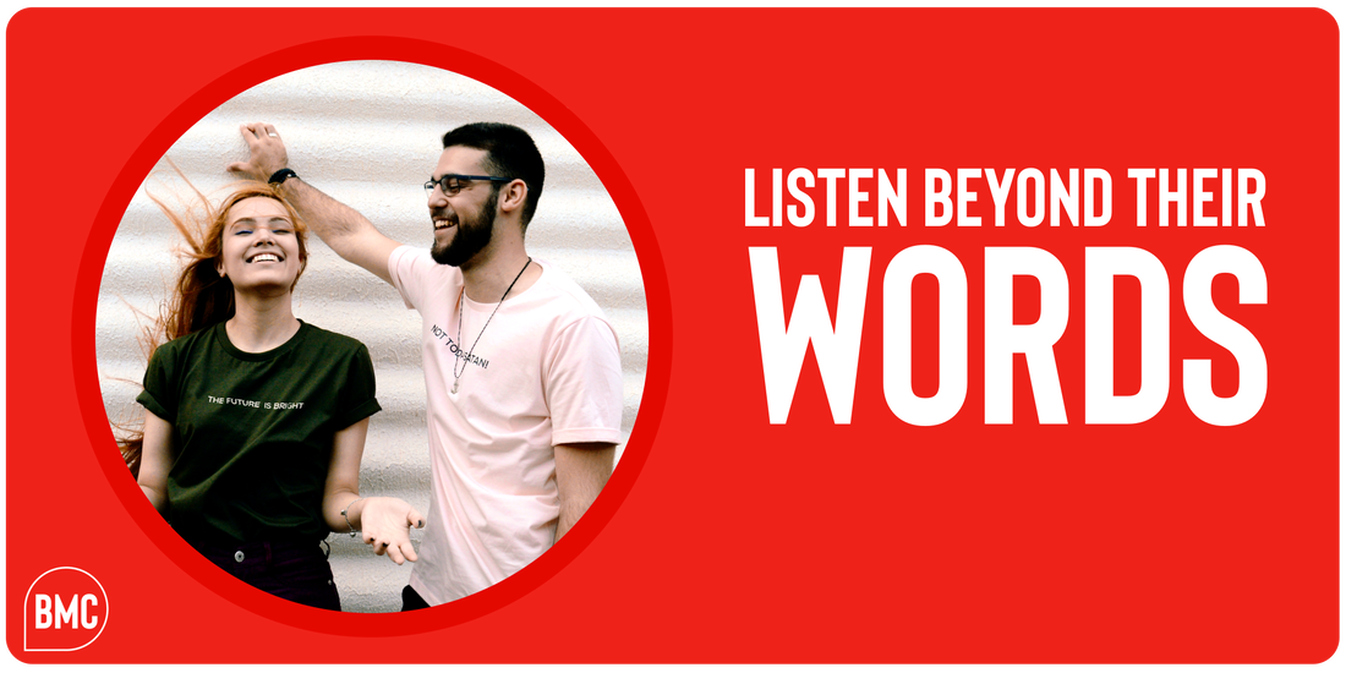
This is another way to make people feel more comfortable.
If you can listen to someone and think of a few reasons a person said something in particular, you can dig deeper by asking them about the reasons.
If you ask someone what they did over the weekend, they may say, “Visited my family.” You could reply with something easy like “cool,” or you could dig a little deeper.
The fact they mentioned their family could mean there is a new addition or something. Asking something like “was it a special occasion?” shows interest and allows the chat to keep going in the same direction.
Listening to tone is part of this as well. In the example above, someone may say “I visited my family” but with a trailing tone and a hung head.
This could be because something happened to a family member. Asking “is everything okay?” shows concern and attention, and talking about the occasional negative subject can build trust and rapport.
9. Avoid These Rapport Breaking Traps!
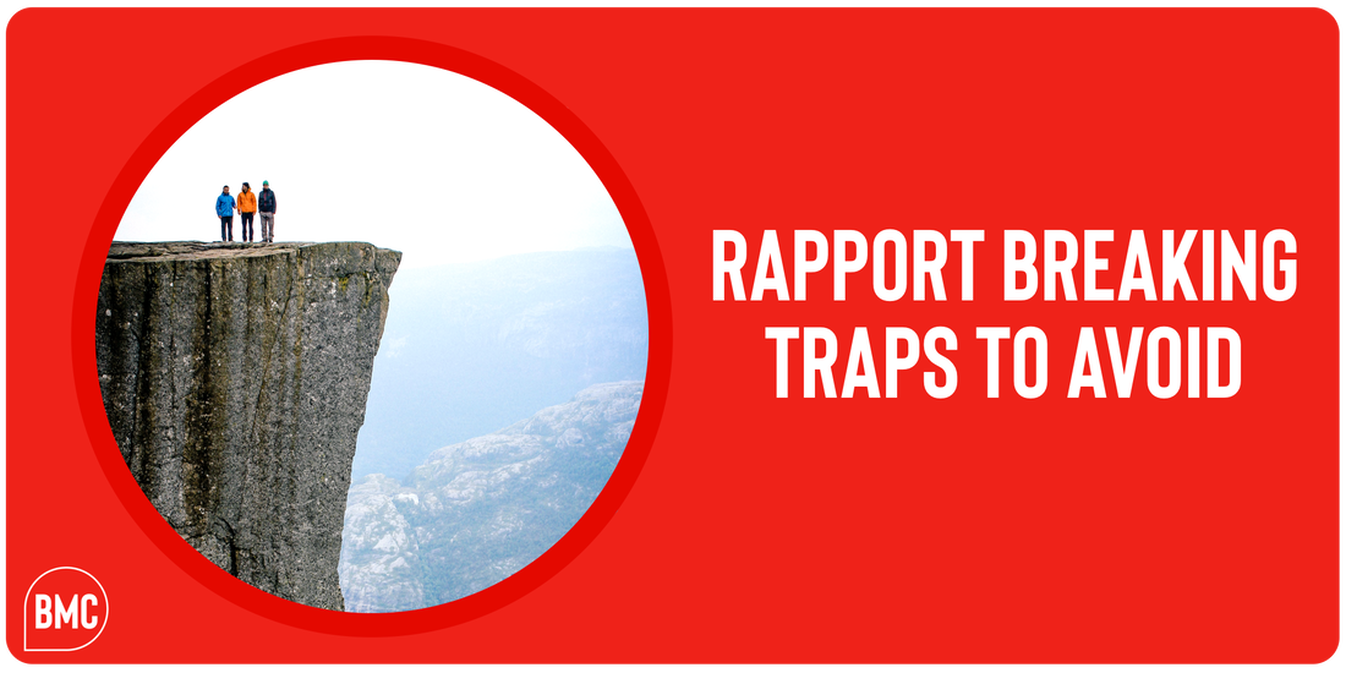
Just as there are plenty of ways to build rapport, there are also some ways to break it, and avoiding these traps can mean staying in rapport with individuals who you see on a regular basis or may even need to depend on (and vice versa) in the workplace.
Avoid “stop words”
A quick way to make someone uncomfortable is by pushing back too much.
Replying to someone with “well, actually…” can be taken as rude. Instead, let the person you know you like what they said with something like “I see where you’re coming from.”
Then you can say something like “I have a slightly different take, mind if I share?” Other “stop words” include “but,” and “however,” so don’t use them too much.
Don’t be “that person”
Don’t talk about brain surgery at a BBQ is a good way of thinking about this one.
Make sure that if you are going to chime in on a conversation that you keep it relaxed. Sometimes this means just biting your tongue if you feel an urge to educate someone who doesn’t seem like they want to be educated.
Avoid judgement
Understand that everyone is different.
Some people may not be as knowledgeable on a subject as you, but you shouldn’t jump to conclusions about them based on one or two topics.
Give people the benefit of the doubt when you’re getting to know them, and focus on shared interests rather than things you might not agree with the person on.
How To Build Rapport Action Steps
- Learn about who you’ll be talking to, then bring up those topics!
- Empathize with people. What is it like to be them?
- Remember their names - repeat it once or twice during conversation
- Relate to them (“same here” moments)
- Ask dig questions
- Mix in a little humor
- Use The Mirror Test to see if you're in rapport yet.
- Listen to tones and levels of excitement behind their words
- Avoid being pushy or making an easy conversation difficult (brain surgery at the BBQ)
Next Steps
Want more tips to help you improve your people skills?
Click here and I'll send you my free 56-minute audio guide on joining and enjoying group conversations. (As well as Q&A videos, podcast, and much more)
In the audio guide, you’ll learn…
- How to jump into a conversation that has no opening
- Genuinely Connect With Anyone About Any Topic
- How To Get Out Of Your Head And Stay Present In Group Conversations
- And more (word-for-word scripts, body language while joining a group, etc)
4 ways I can help you level up your communication skills:
1. Private Coaching: I’m the secret weapon top Performers at Google, Netflix, and the US Army trust for people skills coaching. Imagine what I can do for you.
2. Social Accelerator: Social Accelerator is my proven self-paced + group coaching system for turning social awkwardness into confidence, overthinking into action, and hesitation into meaningful connections.
3. My group convos audio guide. Join over 5,000 overthinkers who have supercharged their group conversation skills using tested strategies in my 56-minute audio training.
4. My bestselling book Confidence-Maxxing. What I teach in this book comes from lessons that took me over 20 years and 100,000 conversations to learn. If you've ever felt like people skills are something you should've figured out by now but haven't, I wrote this for you.

I'm Jeff Callahan
I make it nearly impossible for overthinkers to fail at improving their people skills. (I've helped hundreds of people over the last 10 years)
Want to never run out of things to say in conversation again so you connect with more people and make new friends?
Want to speak up more in important meetings at work so you get promoted faster and have an awesome career?
Want to develop unshakeable social confidence and competence so you can walk into any room and feel like you belong there?
As your coach, I'll help you move forward faster.



















